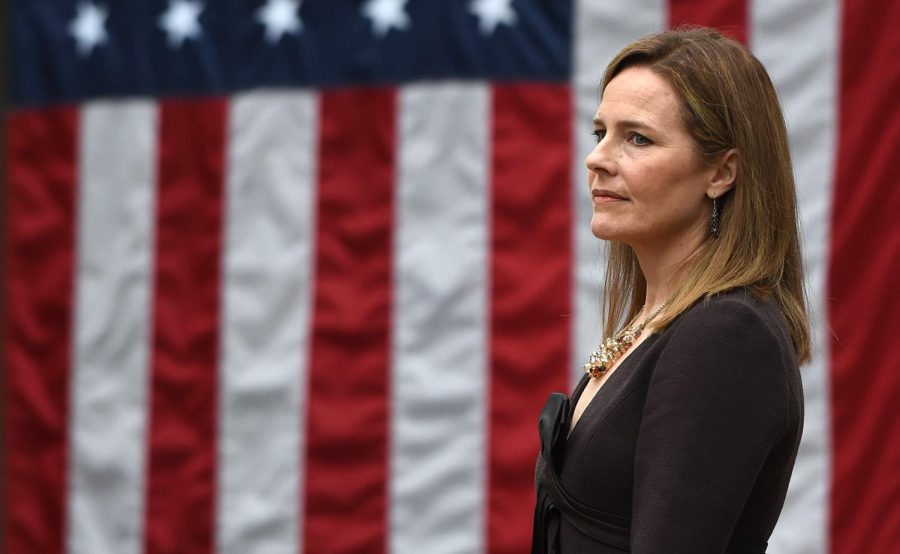With just over two weeks to the general election, the nation’s attention has been focused almost exclusively on the presidency. But the nomination of Judge Amy Coney Barrett to replace Associate Justice Ruth Bader Ginsburg on the Supreme Court has forced many student activists and professors to divert their attention.
Hearings for Barrett’s appointment began last week and were headed by Senate Republicans following the death of Ginsburg on September 18. President Trump quickly nominated Barrett to fill her position and the Senate Judiciary Committee will conduct a final vote on her nomination on October 22.
Barrett graduated from Notre Dame Law School and went on to become a professor at that same university after spending time as a clerk for Justice Antonin Scalia and working for a private firm, according to NPR. She was nominated by Trump to be a judge on the Seventh Circuit Court and has been serving in that role for three years.
“She strikes me as being–from a legal point of view–very eminently qualified for the court,” John Kincaid, Government and Law professor, said. “So she’s a very strong nominee from that perspective.”
Barret is known for her originalist take on the constitution–interpreting the document by trying to apply original intention from the framers, according to AP News. Many Republican figures have lauded this nomination, hoping that it will heavily shift the balance of the bench from a 5-4 conservative majority to a 6-3 conservative majority.
“If she’s serious about trying to apply the letter of the law in the letter of the Constitution, it would have a constraining and restricting effect on certain policies that might interpret the constitution more elastically,” Kincaid said. “Particularly ones enacted by Democratic Congresses, which tend to go in that direction.”
Specific court rulings that many Democrats are nervous about being overturned with such a large conservative majority include Roe vs. Wade, the case that protects a woman’s right to choose to have an abortion, Obergefell vs. Hodges, the case that allowed for marriage equality, and the upcoming California vs. Texas, which would rule on the Affordable Care Act.
“I’m definitely really worried about the direction of the court as a whole, as six conservative justices could have really detrimental effects on policy in the United States,” Sam Jeske ’21, President of College Democrats, said. “Republicans have publicly stated that their goal is to strike down those landmark cases, so it’s really terrifying to see things like that come under the radar of cases that could be overruled.”
Many have decried the nomination coming so close to the election, likening it to 2016, when former president Barack Obama’s Supreme Court nomination, Merrick Garland, was blocked by Senate Republicans.
“It just really seems hypocritical, especially since Garland’s nomination was blocked almost exactly four years ago,” Jeske said. “The Republican’s reasoning was to allow the new president to choose the Supreme Court justice, but now, right before an election, with millions of people already having voted, they are obviously going back on that.”
However, Kincaid noted that this filling of the bench is not entirely unusual. Referencing John Adam’s appointment of John Marshall after he lost his reelection, Kincaid said that it was typical for a nominee to be approved in an election year if the Senate majority and the President belong to the same party. He noted that the specific approval of Barrett this close to an election is unprecedented.
“It is the president’s lawful duty to nominate a judge to the Supreme Court when a vacancy occurs,” Maxwell Hook ’23, vice president of College Republicans, said. “However, I do not think that it is the right thing to do if this vacancy occurs this close to the elections.”
Trump remarked that while choosing a replacement for Justice Kennedy in 2017 that he was saving Barrett to specifically replace Ginsburg, who was known for her work and support of women’s rights.
Megan Deacon ’21, president of Women in Law, said that while she was glad a woman was nominated, she was worried that Ginsburg’s legacy would be threatened by Barrett.
“Obviously RBG has done phenomenal work to improve the rights of women,” Deacon said. “I think Judge Barrett’s being on the bench could risk that because by adding her you’ve got an overwhelming conservative ideology and in general, that seems to repress women’s rights rather than help it.”
“Putting politics aside, I think it is amazing that we’ve got a woman nomination for the Supreme Court and I’m glad that she is filling in and they didn’t choose a man to fill RBG’s seat,” she added. “My club’s purpose is to encourage and support women who wish to pursue a career in law, so in that regard, it is great to see more female representation in the judiciary system.”
Many Democrats agree that RBG’s dedication to civil rights is a legacy that may not be upheld by Barrett and a heavily conservative court.
“I don’t love the fact that Republicans are just viewing it as replacing one woman with another woman, which is a major oversimplification,” Jeske said. “I was obviously devastated at the news of Ginsburg, but I have been thinking much more in terms of policy implications than of her gender.”
Another aspect of this nomination is what Barrett’s nomination means for the future of the Supreme Court. Senate minority leader Chuck Schumer has floated the idea of court-packing if Biden wins the election, which would involve expanding the number of seats on the Court and thus filling it with more justices in a certain party’s favor, according to the New York Times.
“I think packing the court by adding seats to the court would be a very disastrous move. It would be very institutionally destructive,” Kincaid said. “So regardless of how one feels as to whether Trump should be pushing this nomination now, that does not justify a major institutional change, like increasing the number of seats in the court just to appoint justices who agree with you.”
Others agree with Schumer.
“McConnell has refused to fill a bunch of those Obama appointees, which can be another form of court-packing. Republicans have done this on a state level a ton of times. I think they tried to add seats to the Supreme Court in Florida four years ago,” Jeske said. “Many people believe that Democrats are just about to break this norm when in reality that’s not the case at all. So when it comes to my preferences, I’m absolutely in favor of court-packing.”
Deacon noted that she thought students have been paying less attention to the nomination process than the general election.
“A lot of people are involved in the Lafayette Votes campaign,” Deacon said. “But it’s really hard to gauge and encourage interest in the nomination process because we’re all so far away from each other.”
Kincaid said he saw a similar lack of participation from students in regards to Barrett’s hearings. He talked to his classes about the Affordable Care Act, court-packing and other things that may come up in the process and said that his students weren’t actively paying attention to the nomination.
Jeske theorized this lack of interest was because of the general lack of control citizens have over Supreme Court nominations.
“People have been calling on House and Senate offices specifically, calling their senators, expressing their displeasure for the nomination and the fact that they would like them to vote against it,” Jeske said. “But again, there’s not much you can do in a scenario of this because it is completely out of the people’s hands, because Republicans have decided to just force this through before an election. So our main focus is still on the upcoming elections.”
“I think it’s definitely an issue that students care about, even if they’re not tuning in to the hearings because they know that it affects young people more in a sense,” Jeske added. “The Supreme Court is an institution that is unlike elections in the sense that one specific event can have consequences 40 years down the road.”
Correction 11/23/22: A previous version of this article misidentified Senator Chuck Schumer as the House majority leader. At the time of this article’s publication, he was the Senate minority leader.



























































































































